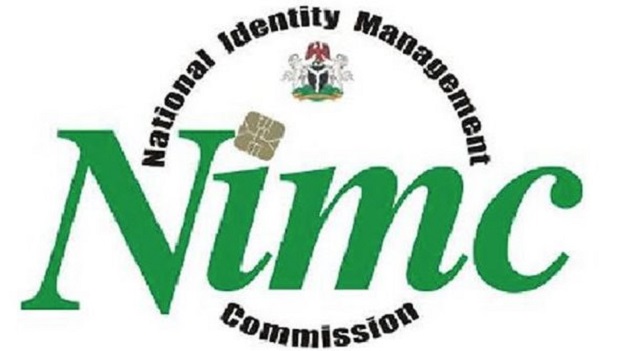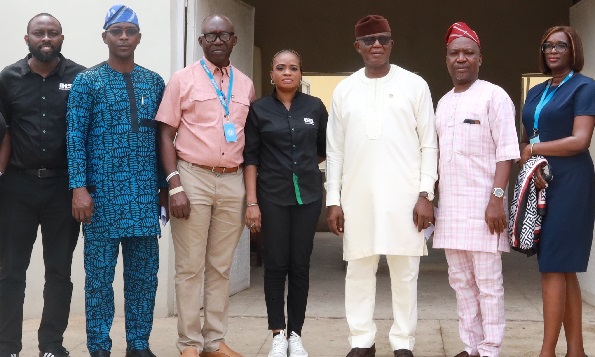News
National Assembly Moves to Strengthen NIMC’s Regulatory Functions

The National Assembly has moved to repeal the 2007 National Identity Management Commission (NIMC) Establishment Act and enact a new bill to strengthen the regulatory functions of the commission.

Kayode Adegoke, the Head of Corporate Communications Unit of the NIMC disclosed this in a statement on Friday.
It would be recalled that this is coming as Nigeria’s National Identity Number enrollment surpassed the 107 million mark as of May 2024.
If enacted, the Commission said the new bill will ensure the efficacy and inclusivity of the Identity Management System (IMS).
According to him, the amendment seeks to fortify the foundational framework of the NIMC and its operations by expanding the scope of registrable persons.
“This updated and comprehensive bill embodies several proposed amendments designed to improve the effectiveness and inclusivity of the Nigeria ID System.
“The benefit to the country is a more comprehensive and inclusive identification system, which enhances national security, facilitates efficient service delivery and promotes financial inclusion.
“The bill also aims to streamline the sharing of personal data, incorporating robust data protection measures to safeguard the privacy and confidentiality of individuals’ data and foster trust among citizens in the handling of their information.
“It also enhances NIMC’s administrative enforcement Power to ensure timely and accurate compliance with ID registration requirements.
“The NIMC repeal and enactment bill, when passed into law, will lead to a more streamlined registration process, reducing bureaucratic hurdles and enhancing the reliability of the Nigeria ID System”, the commission stated.
News
Airtel Smartcash Set to Power Stress-Free Easter with Seamless Cashflow

As Nigerians prepare to celebrate Easter with loved ones across the country, leading mobile money operator Smartcash Payment Service Bank (PSB) has announced an easier system by which customers may upgrade their wallets from Tier 1 to Tier 3 for a smooth, cashless, and stress-free holiday experience.

Offering improved security, access, and reliability, the Smartcash app now enables instant verification with customers’ NIN or BVN, secure facial recognition with a selfie, and simplified address confirmation.
Upgrading from Tier 1 wallet provides higher transaction limits and access to more features and benefits as well as security.
According to the Chief Executive Officer of Smartcash PSB, Tunde Kuponiyi, Smartcash is concerned with ensuring a stress-free experience for customers.
“As the Easter season approaches, we recognize the financial pressure and logistical challenges that often come with holiday spending and mobility. That’s why we’re committed to ensuring that our users can carry out essential transactions from bank transfers to merchant payments quickly, safely, and conveniently.
“Our goal is to eliminate the stress of cash handling, long queues, and bank branch visits, so that Nigerians can truly focus on the spirit of the season connection, community, and celebration,” he said.
Smartcash PSB is providing a reliable, cashless alternative that meets the financial needs of users wherever they are. Whether it’s sending money to loved ones, paying at local markets and stores, or topping up airtime and data, Smartcash users can look forward to uninterrupted and efficient services throughout the holiday season.
Airtel Smartcash PSB, which launched as part of Airtel’s commitment to deepen financial inclusion, has rapidly expanded its network of agents and digital wallet users, bridging access between underserved communities and the financial system.
With services available through mobile phones and human agents across Nigeria, Smartcash offers a simple and accessible entry point into the digital economy particularly for small-scale traders, artisans, rural dwellers, and other players in the informal sector.
News
OOUTH Commends IHS Nigeria, UNICEF for Life-Saving Oxygen Plant Donation

IHS Nigeria, part of the IHS Holding Limited (NYSE: IHS) (“IHS Towers”) group, one of the largest independent owners, operators, and developers of shared communications infrastructure in the world by tower count, recently visited the Olabisi Onabanjo University Teaching Hospital (OOUTH), Sagamu, to evaluate the operational status and impact of the oxygen plant donated by IHS Nigeria in collaboration with United Nations Children’s Fund (UNICEF) and the Canadian Government in 2023 as part of a collaborative health infrastructure intervention initiative.

The oxygen plant which was donated as part of IHS Nigeria’s commitment to improving Nigeria’s healthcare system through sustainable, impactful initiatives is designed to serve not only the teaching hospital, but also other health facilities in the region.
The oxygen plant is equipped with 50 units of 6-cubic-meter cylinders and 150 units of 3 cubic meter cylinders that currently supplies critical departments across the teaching hospital including Anesthesia, the ICU, Pediatrics, Accident and Emergency, Labour, and Surgery departments. The hospital management acknowledged the difference the plant has made in ensuring prompt availability of oxygen even for patients who are unable to pay and in improving the medical outcomes for many patients who need oxygen as part of their management.
Accompanying the team on the visit was the Honorable Commissioner for Environment in Ogun State, Ola Oresanya, who was invited to witness the outcome of the partnership and its alignment with the state’s public health and environmental objectives.
He lauded the initiative for its timeliness and noted that the impact of the donation could not be easily quantified in terms of its relevance to healthcare delivery and its sustainable energy and environmental management which supports the state government’s vision for a healthier and more resilient Ogun State.
Titilope Oguntuga, Director, Sustainability, IHS Nigeria, commented “As a responsible organization, we find ways to impact communities in the markets we serve. In demonstrating our commitment, we also ensure that our investments are running smoothly, which is why we visited OOUTH. This is the first institution we donated an oxygen plant to and is also the first we are visiting to assess its impact and operational status.
“We are humbled by the acknowledgment and testimonies from the OOUTH management. This increases our resolve to continue to create meaningful and sustainable impact through infrastructure that saves lives and strengthens communities.”
Celine Lafoucriere, Chief of Field Office, UNICEF, commented “We cannot overemphasise the power of partnerships in achieving health equity. This is what building resilience in health systems entails: combining expertise, funding, and a shared goal.”
Dr. Oluseun Adeko, Chairman, Medical Advisory Committee (representing the Chief Medical Director of OOUTH), commented “This oxygen plant has not only enhanced our ability to manage emergencies and respiratory cases, but it has also saved lives beyond our hospital, as it serves as a source of oxygen for other hospitals. We deeply appreciate IHS Nigeria and UNICEF for their foresight and generosity.”
News
DG NITDA Urges Foreign Investors to Tap into Nigeria’s Digital Future

In a spirited and visionary appeal, the Director General of the National Information Technology Development Agency (NITDA), Kashifu Inuwa CCIE, has issued a compelling invitation to global investors to explore Nigeria’s burgeoning digital economy, describing it as a land of opportunity powered by a youthful, tech-savvy, and highly innovative population.

The DG made this known when he engaged with global key players in the IT sector, including startups and investors during a GITEX Breakfast meeting at the GITEX Africa 2025 which is currently being held in Marrakech, Morocco.
Speaking ahead of GITEX Nigeria 2025, a major technology and investment conference set to take place from September 1 to 4 in Abuja and Lagos, Inuwa painted a vibrant picture of Nigeria’s digital landscape where according to him, innovation meets opportunity, and where government commitment aligns with grassroots entrepreneurial drive.
“Nigeria is a country with a large, youthful, innovative, creative, and highly competent workforce, where startups and scale-ups can continuously thrive, and where entrepreneurial spirit and technological advancement shape and create the landscape,” he stated.
He emphasised that Nigeria, with over 70% of its population under the age of 25, holds one of the youngest populations globally, positioning it as a talent hub for the Fourth Industrial Revolution.
The NITDA boss further noted that the government’s vision aims to elevate Nigeria into an emerging global digital economy through comprehensive reforms, infrastructure investment, and an aggressive digital literacy agenda.
“The president is also bullish about building our digital infrastructure and wants to establish our digital sovereignty, providing a platform for our citizens to develop digital offerings that Nigeria can take to the world,” he said.
While outlining initiatives aimed at embedding digital skills across the formal education system and enhancing national digital capabilities, he noted that the nation is not just teaching young people to consume technology but empowering them to create it.
Recognising the importance of digital sovereignty, Inuwa added “We are also promoting cloud adoption because you cannot succeed today with on-prem infrastructure, but you need to be on the cloud, and you need to have agility.”
Underscoring the significance of Nigeria and Africa’s digital native population and boundless talent, Inuwa mentioned that the continent should not just participate in the Fourth Industrial Revolution but should lead.
He disclosed that the GITEX Nigeria conference is set to be a milestone moment with Abuja which is the nation’s policy capital, hosting discussions on investor-friendly reforms and policy frameworks, and Lagos, the home to Africa’s most vibrant startup ecosystem, showcasing the energy, innovation, and investment potentials.
“We have the talent and we have the digital native population and we are nurturing an innovative and entrepreneurial ecosystem because we need to challenge the status quo, we need to use technology to disrupt the way we do things and we need to create a collective intelligence where people work with technology to make lives better and that is the Nigeria we are creating,” he concluded.
In his remark, the sales director of ZOHO, Mr Vijayaragavan Venugopal stated that Zoho has been predominantly focusing on the African market for the last 7 years and has witnessed tremendous growth in the African market, with Nigeria leading at the forefront.
“We are happy that we are going to be there in Nigeria along with GITEX and the event will not only empower the Nigeria market but the whole of Africa and it is going to be an opportunity to gather amongst each other, talk about tech, and grow together in the entire African market,” he said.
While giving her remark, the CEO of Alami Capital, Olu Olufemi White, highlighted the importance of investing in startups that center people in their solutions and challenged traditional investment approaches that ignore the human element.
Expressing her commitment to transforming communities through thoughtful and strategic innovation, she emphasised the need for impactful, innovative, and scalable ventures while however, noting that technology can only thrive with reliable energy and sustainable finance.
Appealing to everyone for active participation at the forthcoming GITEX Nigeria while making reference to the market activity from Google, Cisco, and Flutterwave, White said “You can start to see what happens when you support us. Please don’t wait till we become big and the rest of the world begins to tell our stories, we want you to tell it for us and we want to walk and work hand in hand with you to build the nation of our dreams.”

 Telecom2 days ago
Telecom2 days agoSalesforce Revolutionizes Business Intelligence with AI-Powered Tableau Next

 Broadcasting2 days ago
Broadcasting2 days agoMultiChoice Brings Easter Home with Dedicated Pop-Up Channel

 News2 days ago
News2 days agoAirtel Smartcash Set to Power Stress-Free Easter with Seamless Cashflow

 Telecom3 days ago
Telecom3 days agoDRIF25 Brings Together 1,000 Delegates in Lusaka

 Telecom3 days ago
Telecom3 days agoGoogle Launches 2025 AI Startups Accelerator Program for African Innovators

 News3 days ago
News3 days agoOOUTH Commends IHS Nigeria, UNICEF for Life-Saving Oxygen Plant Donation

 E-Business2 days ago
E-Business2 days agoDG NITDA Tasks Africa to Lead the AI Revolution Through Strategic Leadership, Inclusive Innovation

 General News3 days ago
General News3 days agoMoMo PSB Launches Refer & Win Promo: Free Airtime or Data for Life Awaits Nigerians















